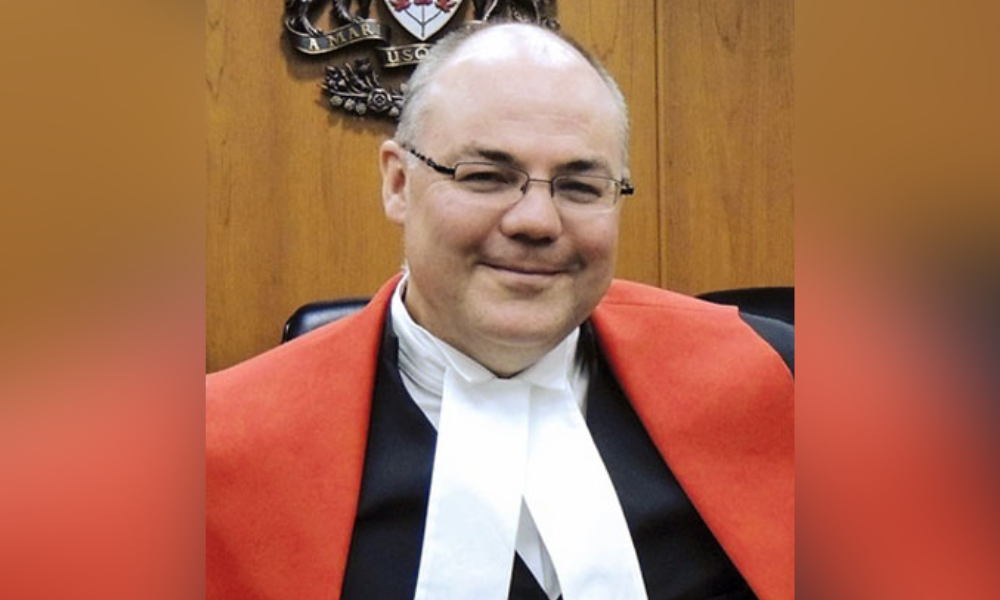
News comes more than a month after judge was put on unexplained leave of absence

The Canadian Judicial Council said Tuesday it is reviewing a complaint into the alleged conduct of Justice Russell Brown of the Supreme Court of Canada, following reports of his unexplained leave of absence since the beginning of February.
However, why the SCC did not indicate why Justice Brown is on leave is disconcerting to some legal watchers.
"The overall lack of transparency surrounding Justice Brown's leave of absence is concerning and is leaving the door open to speculation and confusion,” said Amy Salyzyn, an associate professor of law at the University of Ottawa and an expert in legal ethics, lawyer regulation and access to justice. This “doesn't seem healthy for public confidence in the court."
Judicial Council received complaint in late January
The council said in a news release that the complaint against Justice Brown was received on Jan. 29 and was referred to the Honourable Christopher Hinkson, Chief Justice of the Supreme Court of British Columbia, and Chairperson of the CJC’s Judicial Conduct Committee.
On Jan. 31, Chief Justice Hinkson asked Justice Brown to comment on the allegations in the complaint. Justice Brown provided his comments on Feb. 20.
The council statement noted that, as with any complaint against a judge, “this matter is being reviewed in accordance with the Council’s review procedures .” Under the Judges Act, the CJC can investigate complaints against federally appointed judges.
“All investigations are conducted according to the review procedures mentioned above,” the CJC statement said, pointing out that s. 2.2 of those procedures provides that the Chairperson of the CJC, the chief justice of the SCC, “does not participate in the consideration of complaints.”
The council acknowledged that it released its statement on Tuesday “in light of questions being raised regarding the absence of a justice of the Supreme Court of Canada, the highest court in the country that is comprised of only nine judges.” Chief Justice Hinkson, as chairperson of the CJC’s conduct committee, “decided that it was in the public interest to announce the review of this matter.”
One of the council’s fundamental priorities, the statement said, “is ensuring public confidence in the judiciary, including the judicial conduct process.” It added that it is the responsibility of the chairperson of the judicial conduct committee of the CJC Council to determine “when and what information must be disclosed” regarding conduct matters.
“In doing so, he must weigh and balance various principles, notably transparency and public interest, as well as judicial independence and privacy.”
However, the council said it would not comment further on the matter.
Unexplained absence of judge raised concerns about SCC transparency
Late last month, a spokesperson for the Supreme Court said Brown had been on leave since Feb. 1 on a confidential matter. His absence from the bench was first noticed when Law360 Canada, an online legal news service, asked the SCC why Brown was not included in an 8-0 judgment on the appeal of a man convicted of sexual assault.
Brown's absence was mentioned in a single line in that judgment: "Brown J. did not participate in the final disposition of the judgment."
In its statement Tuesday, the SCC said that in light of the CJC news release, it could provide a few more “clarifications” regarding Justice Brown’s absence.
“On January 31, 2023, the Council notified the Right Honourable Richard Wagner, P.C., Chief Justice of Canada, of the complaint. The following day, after speaking with Justice Brown, Chief Justice Wagner put him on leave from his duties at the Supreme Court of Canada, with immediate effect, awaiting a determination of the complaint by the Council.”
The statement said Chief Justice Wagner notified the minister of justice for Canada, David Lametti, of the decision, as required by the Judges Act.
“A review of the complaint by the Council is ongoing, in accordance with the Judges Act and the relevant procedures.” The SCC statement said any inquiries about the complaint should be directed to the CJC.
In addition, the statement says that as “an open and transparent institution, the court continues to serve its important role in Canadian democracy” and the public interest.
“In this regard, all necessary arrangements for the Court to continue its work seamlessly have been made, including ensuring appeals are heard, reserved judgments are rendered, and applications for leave to appeal are decided. As set out in the Supreme Court Act, the Court may sit with a minimum of five judges.”
The Canadian Judicial Council was created in 1971 to carry out investigations into the judiciary's improper conduct and maintain the profession’s standards.
Brown was appointed to the Supreme Court of Canada on Aug. 25, 2015. Before joining the highest court in the land, Justice Brown was the chair of the Health Law Institute and the University Appeals Board and chair of the Professional Review Board at the University of Alberta.